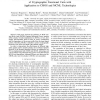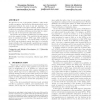80 search results - page 7 / 16 » Protecting Cryptographic Keys against Continual Leakage |
CTRSA
2009
Springer
14 years 2 months ago
2009
Springer
Abstract. Fault Analysis is a powerful cryptanalytic technique that enables to break cryptographic implementations embedded in portable devices more efficiently than any other tech...
EUROCRYPT
2009
Springer
14 years 8 months ago
2009
Springer
A weak pseudorandom function (wPRF) is a cryptographic primitive similar to ? but weaker than ? a pseudorandom function: for wPRFs one only requires that the output is pseudorandom...
SAMOS
2007
Springer
14 years 1 months ago
2007
Springer
Abstract— This paper explores the resistance of MOS Current Mode Logic (MCML) against Differential Power Analysis (DPA) attacks. Circuits implemented in MCML, in fact, have uniqu...
JOC
2010
13 years 2 months ago
2010
We describe several software side-channel attacks based on inter-process leakage through the state of the CPU's memory cache. This leakage reveals memory access patterns, whic...
CCS
2005
ACM
14 years 1 months ago
2005
ACM
We introduce a new cryptographic primitive, called insubvertible encryption, that produces ciphertexts which can be randomized without the need of any key material. Unlike plain u...


